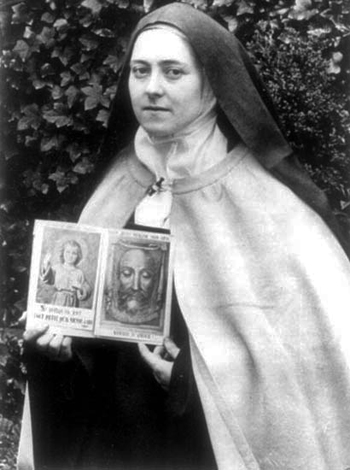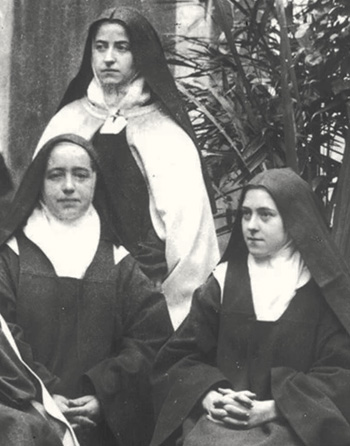Saints of the Day
 |
 |
 |
 |
 |
 |
 |
St. Thérèse of Lisieux - October 3
Suffering & the Little Way
Comments of Prof. Plinio:
A valuable deposition from the canonization of St. Therese of the Child Jesus is given by her sister Celine, Sister Genevieve of St. Teresa. It reveals aspects of the Saint’s life of which few are aware or give due importance.
The information in this Church document is ironclad. Not only was Celine closer to St. Therese than anyone else, but she gave this testimony in an official Church inquiry. Thus, it is scrupulously accurate. In her deposition, she states:
 “The servant of God followed a path of simple confidence and total abandonment to God. She named this her little way of spiritual childhood. She continually corresponded to grace and performed generous acts. This is how she formed herself and her novices.”
“The servant of God followed a path of simple confidence and total abandonment to God. She named this her little way of spiritual childhood. She continually corresponded to grace and performed generous acts. This is how she formed herself and her novices.”
This shows the role that correspondence to grace plays in the Little Way. Most people are very familiar with the sweetness of St. Therese’s spirituality, but neglect the roles of correspondence to grace and suffering.
Doing so, however, denies almost every page of St. Therese’s writings. In fact, she prized suffering so much that it became an integral part of who she was. Celine shows how this sweetness and suffering coexisted in the life of St. Therese.
She says that St. Therese always corresponded to grace. Such correspondence is an act of the will. It consists in accepting the invitation to grace. This requires sacrifice because frequently it forces one to behave contrary to what one desires to do. Though St. Therese is not the saint of great sacrifices, she constantly accepted little, simple and unpretentious ones.
Since these small sufferings were unceasing, they weighed more heavily on her than the great ones would have. At least the latter generally come in waves divided by periods of respite. St. Therese’s life of constant sacrifice demonstrates the great little sufferings of her way.
Celine continues: ˝One day, I read the following passage from the Ecclesiasticus: All mercy shall be granted man according to the merit of his works. I asked the Servant of God why it said according to the merit of his works. She explained to me with passion that if we really had the spirituality of a child and this spirituality was filled with self-surrender and confidence in God, then it was also filled with humility and sacrifice. "
Pay close attention to her response. St. Therese sustained herself on sacrifice.
 ˝She went on to say that each should give himself unreservedly, practice virtue in all circumstance and constantly deny himself. In a word, he should perform every good deed out of love for God. ... This is the desire of little souls who run along the way of spiritual childhood."
˝She went on to say that each should give himself unreservedly, practice virtue in all circumstance and constantly deny himself. In a word, he should perform every good deed out of love for God. ... This is the desire of little souls who run along the way of spiritual childhood."
She finished: “I intentionally said that these souls run, because they never lag behind.”
Thus, the spirit of sacrifice is key to the Little Way. It means constantly offering little sufferings, and at times big ones, in a spirit of spiritual childhood, abandonment and confidence in God.
St. Therese exemplified this spirit. She resolved always to ask for nothing and accept everything. Once, a nun was helping her arrange her habit and inadvertently stuck a pin in her flesh. Faithful to this spirit, St. Therese never complained and left the pin where it was until she retired for the evening.
Thus is the relationship between the Little Way and suffering clear. At the same time, there is still something mysterious about it, because St. Therese’s life and writings, which are filled with afflictions, are also imbued with the perfume of roses.
When one reads the Spiritual Exercises of the great St. Ignatius, who I hold in highest esteem, it makes one’s hair stand on end. However, when St. Therese writes the same thing, in some way it comes with a smile.

Watch a video illustration of this Saint of the Day article here

Related Comments on St. Therese
St. Thérèse of Lisieux - October 3
St. Therese of the Child Jesus: Master of Her Temperament
St .Therese’s Photograph: First Impressions
Her Gaze and Her Contemplative Soul
Childhood: The Principal Stage of St. Therese’s Life
Is Holiness Sentimental Softness or Strength of Soul?
An Unknown Prophecy of St. Therese

The Saint of the Day features highlights from the lives of saints based on comments made by the late Prof. Plinio Corrêa de Oliveira. Following the example of St. John Bosco who used to make similar talks for the boys of his College, each evening it was Prof. Plinio’s custom to make a short commentary on the lives of the next day’s saint in a meeting for youth in order to encourage them in the practice of virtue and love for the Catholic Church. TIA thought that its readers could profit from these valuable commentaries.
The texts of both the biographical data and the comments come from personal notes taken by Atila S. Guimarães from 1964 to 1995. Given the fact that the source is a personal notebook, it is possible that at times the biographic notes transcribed here will not rigorously follow the original text read by Prof. Plinio. The commentaries have also been adapted and translated for TIA’s site.
A valuable deposition from the canonization of St. Therese of the Child Jesus is given by her sister Celine, Sister Genevieve of St. Teresa. It reveals aspects of the Saint’s life of which few are aware or give due importance.
The information in this Church document is ironclad. Not only was Celine closer to St. Therese than anyone else, but she gave this testimony in an official Church inquiry. Thus, it is scrupulously accurate. In her deposition, she states:

St. Therese always corresponded to grace & embraced every suffering
This shows the role that correspondence to grace plays in the Little Way. Most people are very familiar with the sweetness of St. Therese’s spirituality, but neglect the roles of correspondence to grace and suffering.
Doing so, however, denies almost every page of St. Therese’s writings. In fact, she prized suffering so much that it became an integral part of who she was. Celine shows how this sweetness and suffering coexisted in the life of St. Therese.
She says that St. Therese always corresponded to grace. Such correspondence is an act of the will. It consists in accepting the invitation to grace. This requires sacrifice because frequently it forces one to behave contrary to what one desires to do. Though St. Therese is not the saint of great sacrifices, she constantly accepted little, simple and unpretentious ones.
Since these small sufferings were unceasing, they weighed more heavily on her than the great ones would have. At least the latter generally come in waves divided by periods of respite. St. Therese’s life of constant sacrifice demonstrates the great little sufferings of her way.
Celine continues: ˝One day, I read the following passage from the Ecclesiasticus: All mercy shall be granted man according to the merit of his works. I asked the Servant of God why it said according to the merit of his works. She explained to me with passion that if we really had the spirituality of a child and this spirituality was filled with self-surrender and confidence in God, then it was also filled with humility and sacrifice. "
Pay close attention to her response. St. Therese sustained herself on sacrifice.

Three Liseux sisters, Marie, Celine – standing – Therese
She finished: “I intentionally said that these souls run, because they never lag behind.”
Thus, the spirit of sacrifice is key to the Little Way. It means constantly offering little sufferings, and at times big ones, in a spirit of spiritual childhood, abandonment and confidence in God.
St. Therese exemplified this spirit. She resolved always to ask for nothing and accept everything. Once, a nun was helping her arrange her habit and inadvertently stuck a pin in her flesh. Faithful to this spirit, St. Therese never complained and left the pin where it was until she retired for the evening.
Thus is the relationship between the Little Way and suffering clear. At the same time, there is still something mysterious about it, because St. Therese’s life and writings, which are filled with afflictions, are also imbued with the perfume of roses.
When one reads the Spiritual Exercises of the great St. Ignatius, who I hold in highest esteem, it makes one’s hair stand on end. However, when St. Therese writes the same thing, in some way it comes with a smile.
Watch a video illustration of this Saint of the Day article here
St. Thérèse of Lisieux - October 3
St. Therese of the Child Jesus: Master of Her Temperament
St .Therese’s Photograph: First Impressions
Her Gaze and Her Contemplative Soul
Childhood: The Principal Stage of St. Therese’s Life
Is Holiness Sentimental Softness or Strength of Soul?
An Unknown Prophecy of St. Therese
 | |
|
|
The texts of both the biographical data and the comments come from personal notes taken by Atila S. Guimarães from 1964 to 1995. Given the fact that the source is a personal notebook, it is possible that at times the biographic notes transcribed here will not rigorously follow the original text read by Prof. Plinio. The commentaries have also been adapted and translated for TIA’s site.